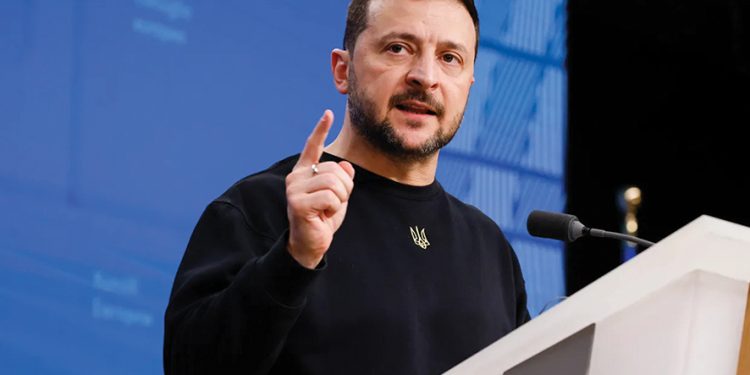President Volodymyr Zelensky tasked the Ukrainian authorities to develop proposals for an internal action plan to help the country withstand the war, a source close to the President’s Office told the Kyiv Independent on October 23.
The source said the document will address military, political, economic, and other areas, including certain decisions regarding law enforcement. The plan is expected to be prepared and presented to the Ukrainian public by the end of 2024.
“The goal is to do everything possible to maintain unity and achieve results in various areas of the country’s development,” a source in Zelensky’s team told BBC.
The plan is reportedly not an alternative to Zelensky’s “victory plan,” and provides for steps to be taken by Ukraine itself. The victory plan includes a defense aspect, non-nuclear deterrence of Russian aggression, economic growth and cooperation, and post-war security architecture. It is also comprised of three classified addenda that have been shared with international partners.
Ukraine’s president said that his victory plan “can bridge the gap between the current situation and a successful peace summit.”
North Korean troops are in Russia, US defense secretary confirms
Nearly 3,000 North Korean soldiers have been sent to Russia support the Kremlin’s war in Ukraine, and “thousands more” are expected to follow, Reuters reported this week, citing South Korean intelligence.
“There is evidence that there are DPRK (North Korean) troops in Russia. What exactly are they doing? Left to be seen. These are things that we need to sort out,” US Defense Secretary Lloyd Austin said in Rome on October 23.
Austin’s comment comes as the first public confirmation by the US of previous statements by Ukraine and South Korea. The two nations say Russia is planning to involve thousands of North Korean troops in its full-scale war.
It is said that the troops have been dispersed to multiple training facilities in Russia and are adapting to the local environment.
North Korea has denied the reports, while a Kremlin spokesperson gave an evasive answer on the issue.
Ukraine stabilizes situation in Toretsk
Ukraine has managed to stabilize the situation in Toretsk in Donetsk Oblast, but the Russian army continues to concentrate its forces in the eastern part of the town, Anastasiia Bobovnikova, a spokesperson of the Operational Tactical Group Luhansk, said on Wednesday, the Kyiv Independent reports.
Toretsk lies some 35 kilometers north of occupied Donetsk. The town became one of the hottest spots in Donetsk Oblast in recent months as Russian troops continue advancing in east Ukraine.
“The situation in Toretsk has relatively stabilized. Ukrainian forces are now holding the demarcation line unchanged. The enemy is still entrenched in the city’s eastern parts,” Bobovnikova said. “We are holding back their further advance and will defend the town as long as possible.”
UN: Russian invasion sends Ukraine population plummeting by 10 million
Ukraine’s population has declined by around 10 million people, or about a quarter, since the start of Russia’s full-scale invasion in 2022, says the United Nations, pointing to the exodus of refugees, a collapse in fertility, and war deaths as the causes.
The invasion has accelerated an already evident population decline that began before the war, the UN agency notes. That number drop matches a trend seen across much of Eastern Europe, but the conflict has worsened the situation.
6.7 million Ukrainian refugees are now living abroad, primarily in Europe, while the birth rate is currently at around one child per woman, which is one of the lowest in the world,” the UN official added.
Al Jazeera: Ukraine’s army is facing a desertion crisis
This year, Ukraine has seen an unprecedented rise in desertion among soldiers, attributed to poor frontline conditions and prolonged service, Al Jazeera writes.
Reports indicate that at least 30,000 prosecutions for desertion have occurred, significantly higher than in previous years. Morale is low, with troops enduring heavy fire and inadequate rest, leading some to prefer prison over the uncertainty of continuous combat. The Ukrainian government has decriminalized first-time desertion attempts, provided individuals return to duty.
As the war drags on, with estimates suggesting tens of thousands of Ukrainian military losses, the army faces critical manpower shortages, exacerbating the situation. Analysts highlight mental and physical fatigue among soldiers, alongside inadequate weaponry, as contributing factors to the increasing desertion rate.
NATO noncommittal on Ukraine’s membership
Though Russia’s gains have been incremental, its steady forward movement is slowly progressing — and Ukraine is pleading for Western help on a larger scale.
Yet NATO Secretary General Mark Rutte has remained noncommittal about Ukraine’s path to joining the alliance even as Ukrainian President Volodymyr Zelensky presents a “victory plan” that hinges on his country becoming a full member before the war ends.
Zelensky said on Wednesday that his “victory plan” could bring peace to the country by next year. However, many of Ukraine’s NATO allies have stopped short of publicly voicing their support for the country completing the accession process while Russia’s invasion continues.
Speaking to reporters on Wednesday at NATO headquarters in Brussels, Rutte was non-committal about Ukraine’s path to membership, saying the priority at this stage is to put Ukraine in a position to negotiate the best possible deal in any future negotiations with Russia.
“We are in close contact with allies, with Ukraine, to see how we can take next steps,” Rutte said, declining to provide details.
Securing NATO membership is the first point in Zelensky’s five-point victory plan, which he has presented to the Ukrainian parliament.
But NATO makes its decisions by consensus, and many allies — including the US and Germany — refuse to allow Ukraine in while fighting continues because they fear the Article 5 obligation would drag them into direct conflict with Russia.
At their summit in Washington in July, NATO’s 32 members declared Ukraine on an “irreversible” path to membership in the Western military alliance, but the question of how fast the process will move went unaddressed.
Compiled by Ana Dumbadze














